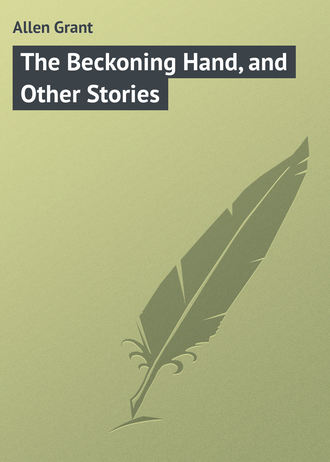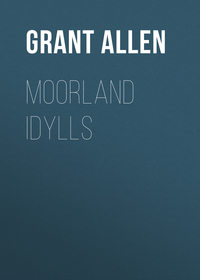 полная версия
полная версияThe Beckoning Hand, and Other Stories
Nevertheless, in his comfortable villa in the park at Cheltenham (called Futteypoor Lodge, after that famous engagement during the Mutiny which gave the Colonel his regiment and his K.C.B. – ship) he stood one evening looking curiously at his big devonport, and muttered to himself with more than one most military oath, "Hanged if I don't think I shall positively be compelled to patronize these banker-fellows after all. Somebody must have been helping himself again to some of my sovereigns."
Sir Thomas was not by nature a suspicious man – he was too frank and open-hearted himself to think ill easily of others – but he couldn't avoid feeling certain that somebody had been tampering unjustifiably with the contents of his devonport. He counted the rows of sovereigns over once more, very carefully; then he checked the number taken out by the entry in his pocket-book; and then he leaned back in his chair with a puzzled look, took a meditative puff or two at the stump of his cigar, and blew out the smoke, in a long curl that left a sort of pout upon his heavily moustached lip as soon as he had finished. Not a doubt in the world about it – somebody must have helped himself again to a dozen sovereigns.
It was a hateful thing to put a watch upon your servants and dependents, but Sir Thomas felt he must really do it. He reckoned up the long rows a third time with military precision, entered the particulars once more most accurately in his pocket-book, sighed a deep sigh of regret at the distasteful occupation, and locked up the devonport at last with the air of a man who resigns himself unwillingly to a most unpleasant duty. Then he threw away the fag-end of the smoked-out cigar, and went up slowly to dress for dinner.
Sir Thomas's household consisted entirely of himself and his nephew Harry, for he had never been married, and he regarded all womankind alike from afar off, with a quaint, respectful, old-world chivalry; but he made a point of dressing scrupulously every day for dinner, even when alone, as a decorous formality due to himself, his servants, society, the military profession, and the convenances in general. If he and his nephew dined together they dressed for one another; if they dined separately they dressed all the same, for the sake of the institution. When a man once consents to eat his evening meal in a blue tie and a morning cutaway, there's no drawing a line until you finally find him an advanced republican and an accomplice of those dreadful War Office people who are bent upon allowing the service to go to the devil. If Colonel Sir Thomas Woolrych, K.C.B., had for a single night been guilty of such abominable laxity, the whole fabric of society would have tottered to its base, and gods and footmen would have felt instinctively that it was all up with the British constitution.
"Harry," Sir Thomas said, as soon they sat down to dinner together, "are you going out anywhere this evening, my boy?"
Harry looked up a little surlily, and answered after a moment's hesitation, "Why, yes, uncle, I thought – I thought of going round and having a game of billiards with Tom Whitmarsh."
Sir Thomas cleared his throat, and hemmed dubiously. "In that case," he said at last, after a short pause, "I think I'll go down to the club myself and have a rubber. Wilkins, the carriage at half-past nine. I'm sorry, Harry, you're going out this evening."
"Why so, uncle? It's only just round to the Whitmarshes', you know."
Sir Thomas shut one eye and glanced with the other at the light through his glass of sherry, held up between finger and thumb critically and suspiciously. "A man may disapprove in toto of the present system of competitive examinations for the army," he said slowly; "for my part, I certainly do, and I make no secret of it; admitting a lot of butchers and bakers and candlestick makers plump into the highest ranks of the service: no tone, no character, no position, no gentlemanly feeling; a great mistake – a great mistake; I told them so at the time. I said to them, 'Gentlemen, you are simply ruining the service.' But they took no notice of me; and what's the consequence? Competitive examination has been the ruin of the service, exactly as I told them. Began with that; then abolition of purchase; then local centres; then that abominable strap with the slip buckle – there, there, Harry, upon my soul, my boy, I can't bear to think of it. But a man may be opposed, as I said, to the whole present system of competitive examination, and yet, while that system still unfortunately continues to exist (that is to say, until a European War convinces all sensible people of the confounded folly of it), he may feel that his own young men, who are reading up for a direct commission, ought to be trying their hardest to get as much of this nonsensical humbug into their heads as possible during the time just before their own examinations. Now, Harry, I'm afraid you're not reading quite as hard as you ought to be doing. The crammer's all very well in his way, of course, but depend upon it, the crammer by himself won't get you through it. What's needed is private study."
Harry turned his handsome dark eyes upon his uncle – a very dark, almost gipsy-looking face altogether, Harry's – and answered deprecatingly, "Well, sir, and don't I go in for private study? Didn't I read up Samson Agonistes all by myself right through yesterday?"
"I don't know what Samson Something-or-other is," the old gentleman replied testily. "What the dickens has Samson Something-or-other got to do with the preparation of a military man, I should like to know, sir?"
"It's the English Literature book for the exam., you know," Harry answered, with a quiet smile. "We've got to get it up, you see, with all the allusions and what-you-may-call-its, for direct commission. It's a sort of a play, I think I should call it, by John Milton."
"Oh, it's the English Literature, is it?" the old Colonel went on, somewhat mollified. "In my time, Harry, we weren't expected to know anything about English literature. The Articles of War, and the Officer's Companion, By Authority, that was the kind of literature we used to be examined in. But nowadays they expect a soldier to be read up in Samson Something-or-other, do they really? Well, well, let them have their fad, let them have their fad, poor creatures. Still, Harry, I'm very much afraid you're wasting your time, and your money also. If I thought you only went to the Whitmarshes' to see Miss Milly, now, I shouldn't mind so much about it. Miss Milly is a very charming, sweet young creature, certainly – extremely pretty, too, extremely pretty – I don't deny it. You're young yet to go making yourself agreeable, my boy, to a pretty girl like that; you ought to wait for that sort of thing till you've got your majority, or at least, your company – a young man reading for direct commission has no business to go stuffing his head cram full with love and nonsense. No, no; he should leave it all free for fortification, and the general instructions, and Samson Something-or-other, if soldiers can't be made nowadays without English literature. But still, I don't so much object to that, I say – a sweet girl, certainly, Miss Milly – what I do object to is your knocking about so much at billiard-rooms, and so forth, with that young fellow Whitmarsh. Not a very nice young fellow, or a good companion for you either, Harry. I'm afraid, I'm afraid, my boy, he makes you spend a great deal too much money."
"I've never yet had to ask you to increase my allowance, sir," the young man answered haughtily, with a curious glance sideways at his uncle.
"Wilkins," Sir Thomas put in, with a nod to the butler, "go down and bring up a bottle of the old Madeira. Harry, my boy, don't let us discuss questions of this sort before the servants. My boy, I've never kept you short of money in any way, I hope; and if I ever do, I trust you'll tell me of it, tell me of it immediately."
Harry's dark cheeks burned bright for a moment, but he answered never a single word, and went on eating his dinner silently, with a very hang-dog look indeed upon his handsome features.
II
At half-past nine Sir Thomas drove down to the club, and, when he reached the door, dismissed the coachman. "I shall walk back, Morton," he said. "I shan't want you again this evening. Don't let them sit up for me. I mayn't be home till two in the morning."
But as soon as the coachman had had full time to get back again in perfect safety, Sir Thomas walked straight down the club steps once more, and up the Promenade, and all the way to Futteypoor Lodge. When he got there, he opened the door silently with his latch-key, shut it again without the slightest noise, and walked on tip-toe into the library. It was an awkward sort of thing to do, certainly, but Sir Thomas was convinced in his own mind that he ought to do it. He wheeled an easy chair into the recess by the window, in front of which the curtains were drawn, arranged the folds so that he could see easily into the room by the slit between them, and sat down patiently to explore this mystery to the very bottom.
Sir Thomas was extremely loth in his own mind to suspect anybody; and yet it was quite clear that some one or other must have taken the missing sovereigns. Twice over money had been extracted. It couldn't have been cook, of that he felt certain; nor Wilkins either. Very respectable woman, cook – very respectable butler, Wilkins. Not Morton; oh dear no, quite impossible, certainly not Morton. Not the housemaid, or the boy: obviously neither; well-conducted young people, every one of them. But who the dickens could it be then? for certainly somebody had taken the money. The good old Colonel felt in his heart that for the sake of everybody's peace of mind it was his bounden duty to discover the real culprit before saying a single word to anybody about it.
There was something very ridiculous, of course, not to say undignified and absurd, in the idea of an elderly field officer, late in Her Majesty's service, sitting thus for hour after hour stealthily behind his own curtains, in the dark, as if he were a thief or a burglar, waiting to see whether anybody came to open his devonport. Sir Thomas grew decidedly wearied as he watched and waited, and but for his strong sense of the duty imposed upon him of tracking the guilty person, he would once or twice in the course of the evening have given up the quest from sheer disgust and annoyance at the absurdity of the position. But no; he must find out who had done it: so there he sat, as motionless as a cat watching a mouse-hole, with his eye turned always in the direction of the devonport, through the slight slit between the folded curtains.
Ten o'clock struck upon the clock on the mantelpiece – half-past ten – eleven. Sir Thomas stretched his legs, yawned, and muttered audibly, "Confounded slow, really." Half-past eleven. Sir Thomas went over noiselessly to the side table, where the decanters were standing, and helped himself to a brandy and seltzer, squeezing down the cork of the bottle carefully with his thumb, to prevent its popping, till all the gas had escaped piecemeal. Then he crept back, still noiselessly, feeling more like a convicted thief himself than a Knight Commander of the Most Honourable Order of the Bath, and wondering when the deuce this pilfering lock-breaker was going to begin his nightly depredations. Not till after Harry came back most likely. The thief, whoever he or she was, would probably be afraid to venture into the library while there was still a chance of Harry returning unexpectedly and disturbing the whole procedure. But when once Harry had gone to bed, they would all have heard from Morton that Sir Thomas was going to be out late, and the thief would then doubtless seize so good an opportunity of helping himself unperceived to the counted sovereigns.
About half past eleven, there was a sound of steps upon the garden-walk, and Harry's voice could be heard audibly through the half-open window. The colonel caught the very words against his will. Harry was talking with Tom Whitmarsh, who had walked round to see him home; his voice was a little thick, as if with wine, and he seemed terribly excited (to judge by his accent) about something or other that had just happened.
"Good night, Tom," the young man was saying, with an outward show of carelessness barely concealing a great deal of underlying irritation. "I'll pay you up what I lost to-morrow or the next day. You shall have your money, don't be afraid about it."
"Oh, it's all right," Tom Whitmarsh's voice answered in an offhand fashion. "Pay me whenever you like, you know, Woolrych. It doesn't matter to me when you pay me, this year or next year, so long as I get it sooner or later."
Sir Thomas listened with a sinking heart. "Play," he thought to himself. "Play, play, play, already! It was his father's curse, poor fellow, and I hope it won't be Harry's. It's some comfort to think, anyhow, that it's only billiards."
"Well, good night, Tom," Harry went on, ringing the bell as he spoke.
"Good night, Harry. I hope next time the cards won't go so persistently against you."
The cards! Phew! That was bad indeed. Sir Thomas started. He didn't object to a quiet after-dinner rubber on his own account, naturally: but this wasn't whist; oh, no; nothing of the sort. This was evidently serious playing. He drew a long breath, and felt he must talk very decidedly about the matter to Harry to-morrow morning.
"Is my uncle home yet, Wilkins?"
"No, sir; he said he wouldn't be back probably till two o'clock, and we wasn't to sit up for him."
"All right then. Give me a light for a minute in the library. I'll take a seltzer before I go upstairs, just to steady me."
Sir Thomas almost laughed outright. This was really too ridiculous. Suppose, after all the waiting, Harry was to come over and discover him sitting there in the darkness by the window, what a pretty figure he would cut before him. And besides, the whole thing would have to come out then, and after all the thief would never be discovered and punished. The Colonel grew hot and red in the face, and began to wish to goodness he hadn't in the first place let himself in, in any way, for this ridiculous amateur detective business.
But Harry drank his seltzer standing by the side table, with no brandy, either; that was a good thing, no brandy. If he'd taken brandy, too, in his present excited condition, when he'd already certainly had quite as much as was at all good for him, Sir Thomas would have been justly and seriously angry. But, after all, Harry was a good boy at bottom, and knew how to avoid such ugly habits. He took his seltzer and his bedroom candle. Wilkins turned out the light in the room, and Harry went upstairs by himself immediately.
Then Wilkins turned the key in the library door, and the old gentleman began to reflect that this was really a most uncomfortable position for him to be left in. Suppose they locked him in there till to-morrow morning! Ah! happy thought; if the worst came to the worst he could get out of the library window and let himself in at the front door by means of his latch-key.
The servants all filed upstairs, one by one, in an irregular procession; their feet died away gradually upon the upper landings, and a solemn silence came at last over the whole household. Sir Thomas's heart began to beat faster: the excitement of plot interest was growing stronger upon him. This was the time the thief would surely choose to open the devonport. He should know now within twenty minutes which it was of all his people, whom he trusted so implicitly, that was really robbing him.
And he treated them all so kindly, too. Ha, the rascal! he should catch it well, that he should, whoever he was, as soon as ever Sir Thomas discovered him.
Not if it were Wilkins, though; not if it were Wilkins. Sir Thomas hoped it wasn't really that excellent fellow Wilkins. A good old tried and trusty servant. If any unexpected financial difficulties —
Hush, hush! Quietly now. A step upon the landing.
Coming down noiselessly, noiselessly, noiselessly. Not Wilkins; not heavy enough for him, surely; no, no, a woman's step, so very light, so light and noiseless. Sir Thomas really hoped in his heart it wasn't that pretty delicate-looking girl, the new housemaid. If it was, by Jove, yes, he'd give her a good lecture then and there, that very minute, about it, offer to pay her passage quietly out to Canada, and – recommend her to get married decently, to some good young fellow, on the earliest possible opportunity.
The key turned once more in the lock, and then the door opened stealthily. Somebody glided like a ghost into the middle of the room. Sir Thomas, gazing intently through the slit in the curtains, murmured to himself that now at last he should fairly discover the confounded rascal.
Ha! How absurd! He could hardly help laughing once more at the ridiculous collapse to his high-wrought expectations. And yet he restrained himself. It was only Harry! Harry come down, candle in hand, no doubt to get another glass of seltzer. The Colonel hoped not with brandy. No; not with brandy. He put the glass up to his dry lips – Sir Thomas could see they were dry and feverish even from that distance; horrid thing, this gambling! – and he drained it off at a gulp, like a thirsty man who has tasted no liquor since early morning.
Then he took up his candle again, and turned – not to the door. Oh, no. The old gentleman watched him now with singular curiosity, for he was walking not to the door, but over in the direction of the suspected devonport. Sir Thomas could hardly even then guess at the truth. It wasn't, no it wasn't, it couldn't be Harry! not Harry that … that borrowed the money!
The young man took a piece of stout wire from his pocket with a terrible look of despair and agony. Sir Thomas's heart melted within him as he beheld it. He twisted the wire about in the lock with a dexterous pressure, and it opened easily. Sir Thomas looked on, and the tears rose into his eyes slowly by instinct; but he said never a word, and watched intently. Harry held the lid of the devonport open for a moment with one hand, and looked at the rows of counted gold within. The fingers of the other hand rose slowly and remorsefully up to the edge of the desk, and there hovered in an undecided fashion. Sir Thomas watched still, with his heart breaking. Then for a second Harry paused. He held back his hand and appeared to deliberate. Something within seemed to have affected him deeply. Sir Thomas, though a plain old soldier, could read his face well enough to know what it was; he was thinking of the kind words his uncle had said to him that very evening as they sat together down there at dinner.
For half a minute the suspense was terrible. Then, with a sudden impulse, Harry shut the lid of the devonport down hastily; flung the wire with a gesture of horror and remorse into the fireplace; took up his candle wildly in his hand; and rushed from the room and up the stairs, leaving the door open behind him.
Then Sir Thomas rose slowly from his seat in the window corner; lighted the gas in the centre burner; unlocked the devonport, with tears still trickling slowly down his face; counted all the money over carefully to make quite certain; found it absolutely untouched; and flung himself down upon his knees wildly, between shame, and fear, and relief, and misery. What he said or what he thought in that terrible moment of conflicting passions is best not here described or written; but when he rose again his eyes were glistening, more with forgiveness than with horror (anger there never had been); and being an old-fashioned old gentleman, he took down his big Bible from the shelf, just to reassure himself about a text which he thought he remembered somewhere in Luke: "Joy shall be in heaven over one sinner that repenteth, more than over ninety and nine just persons, which need no repentance." "Ah, yes," he said to himself; "he repented; he repented. He didn't take it. He felt he couldn't after what I said to him." And then, with the tears still rolling silently down his bronzed checks, he went up stairs to bed, but not to sleep; for he lay restless on his pillow all night through with that one terrible discovery weighing like lead upon his tender old bosom.
III
Next morning, after breakfast, Sir Thomas said in a quiet tone of command to Harry, "My boy, I want to speak to you for a few minutes in the library."
Harry's cheek grew deadly pale and he caught his breath with difficulty, but he followed his uncle into the library without a word, and took his seat at the table opposite him.
"Harry," the old soldier began, as quietly as he was able, after an awkward pause, "I want to tell you a little – a little about your father and mother."
Harry's face suddenly changed from white to crimson, for he felt sure now that what Sir Thomas was going to talk about was not the loss of the money from the devonport a week earlier; and on the other hand, though he knew absolutely nothing about his own birth and parentage, he knew at least that there must have been some sort of mystery in the matter, or else his uncle would surely long since have spoken to him quite freely of his father and mother.
"My dear boy," the Colonel went on again, in a tremulous voice, "I think the time has now come when I ought to tell you that you and I are no relations by blood; you are – you are my nephew by adoption only."
Harry gave a sudden start of surprise, but said nothing.
"The way it all came about," Sir Thomas went on, playing nervously with his watch-chain, "was just this. I was in India during the Mutiny, as you know, and while I was stationed at Boolundshahr, in the North-West Provinces, just before those confounded niggers – I mean to say, before the sepoys revolted, your father was adjutant of my regiment at the same station. He and your mother – well, Harry, your mother lived in a small bungalow near the cantonments, and there you were born; why, exactly eight months before the affair at Meerut, you know – the beginning of the Mutiny. Your father, I'm sorry to say, was a man very much given to high play – in short, if you'll excuse my putting it so, my boy, a regular gambler. He owed money to almost every man in the regiment, and amongst others, if I must tell you the whole truth, to me. In those days I sometimes played rather high myself, Harry; not so high as your poor father, my boy, for I was always prudent, but a great deal higher than a young man in a marching regiment has any right to do – a great deal higher. I left off playing immediately after what I'm just going to tell you; and from that day to this, Harry, I've never touched a card, except for whist or cribbage, and never will do, my boy, if I live to be as old as Methuselah."
The old man paused and wiped his brow for a second with his capacious handkerchief, while Harry's eyes, cast down upon the ground, began to fill rapidly with something or other that he couldn't for the life of him manage to keep out of them.
"On the night before the news from Meerut arrived," the old soldier went on once more, with his eye turned half away from the trembling lad, "we played together in the major's rooms, your father and I, with a few others; and before the end of the evening your father had lost a large sum to one of his brother-officers. When we'd finished playing, he came to me to my quarters, and he said 'Woolrych, this is a bad job. I haven't got anything to pay McGregor with.'
"'All right, Walpole,' I answered him – your father's name was Captain Walpole, Harry – 'I'll lend you whatever's necessary.'
"'No, no, my dear fellow,' he said, 'I won't borrow and only get myself into worse trouble. I'll take a shorter and easier way out of it all, you may depend upon it.'
"At the moment I hadn't the slightest idea what he meant, and so I said no more to him just then about it. But three minutes after he left my quarters I heard a loud cry, and saw your father in the moonlight out in the compound. He had a pistol in his hand. Next moment, the report of a shot sounded loudly down below in the compound, and I rushed out at once to see what on earth could be matter.
"Your father was lying in a pool of blood, just underneath a big mango-tree beside the door, with his left jaw shattered to pieces, and his brain pierced through and through from one side to the other by a bullet from the pistol.
"He was dead – stone dead. There was no good doctoring him. We took him up and carried him into the surgeon's room, and none of us had the courage all that night to tell your mother.









